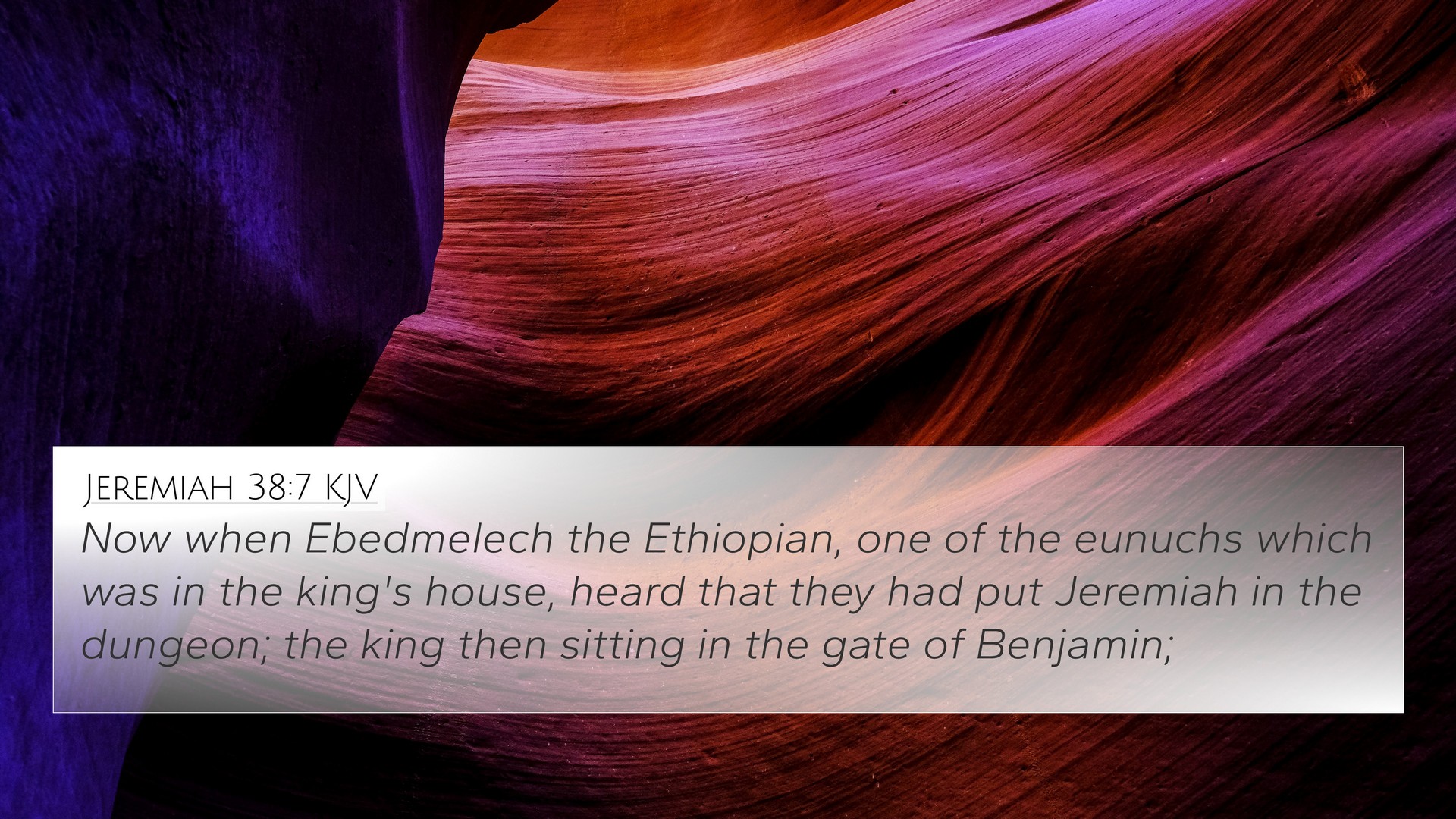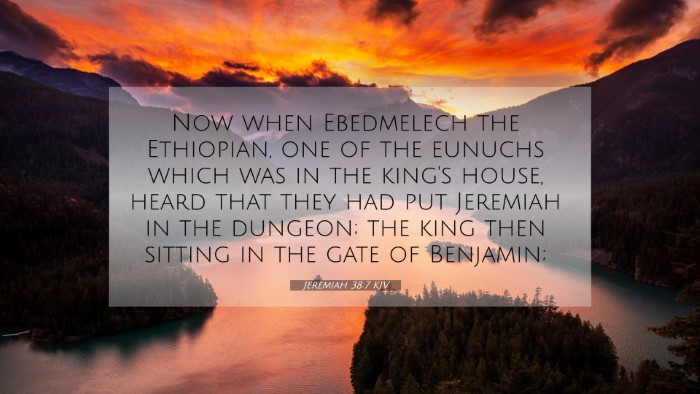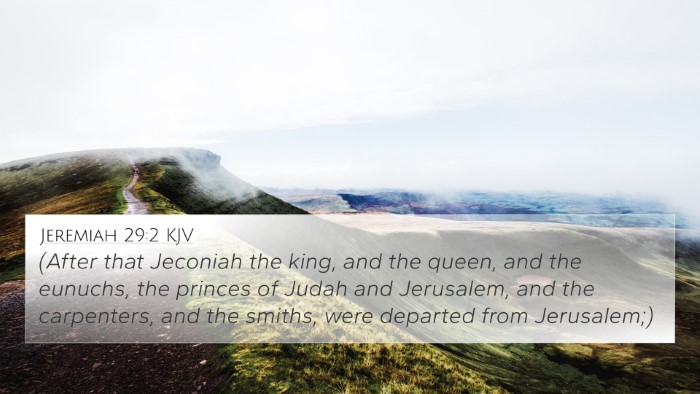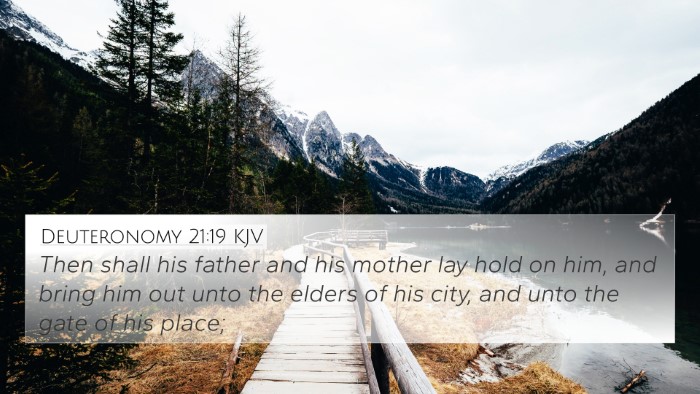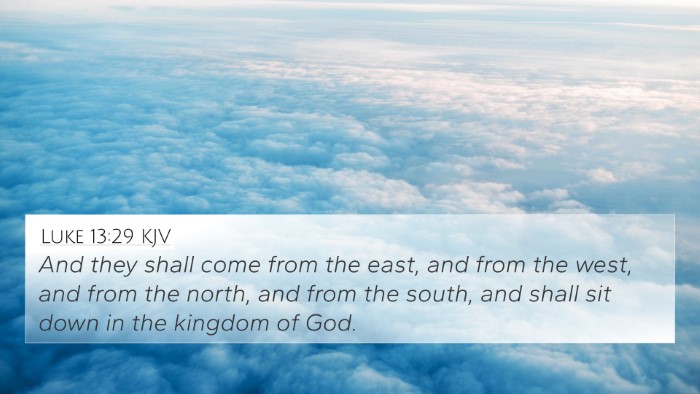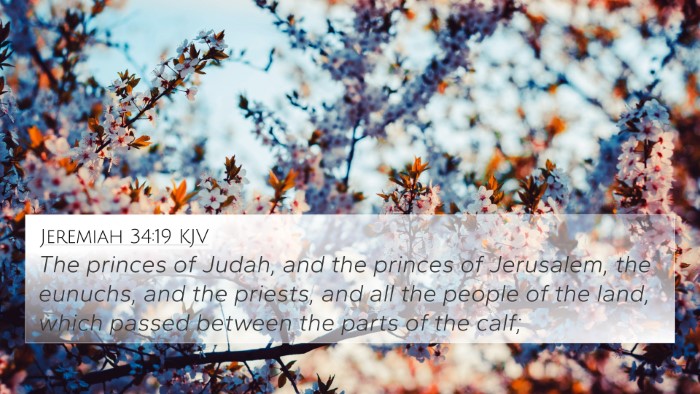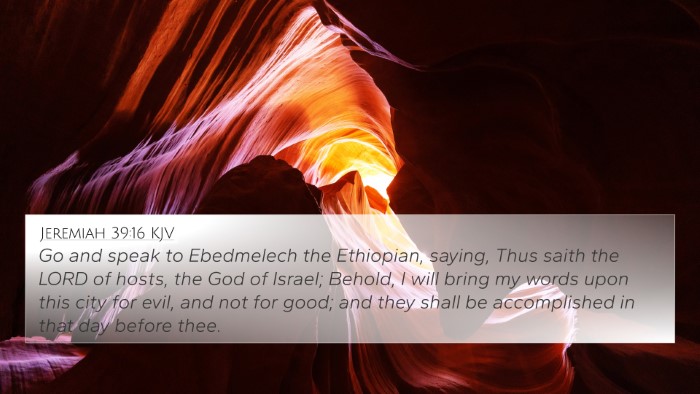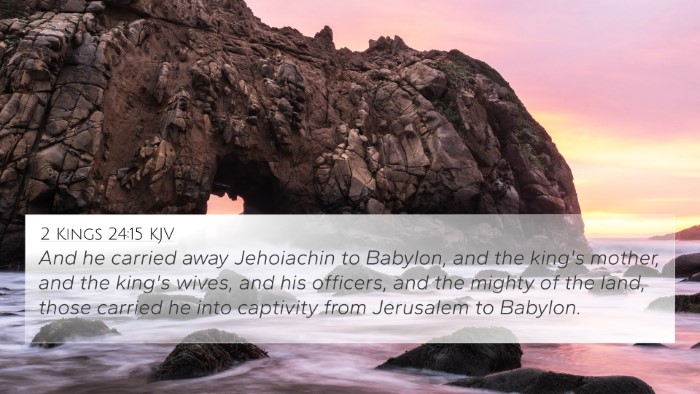Understanding Jeremiah 38:7
Jeremiah 38:7 reads: "Now when Ebed-melech the Ethiopian, one of the king's eunuchs, who was in the king's house, heard that they had put Jeremiah in the pit, the king sitting in the gate of Benjamin." This verse highlights the courage and initiative of Ebed-melech, showcasing a theme of compassion and advocacy.
Contextual Overview
The Book of Jeremiah is a poignant narrative within the Old Testament, chronicling the prophet's ministry. This particular chapter sheds light on the political and social struggles of Israel during a time of impending doom.
Verse Meaning and Insights
The character Ebed-melech is pivotal in this narrative. His actions provide a contrast to the neglect Jeremiah faced from his fellow countrymen. The verse emphasizes a few key elements:
- Courage: Ebed-melech steps forward to rescue Jeremiah, illustrating true bravery.
- Compassion: His concern for Jeremiah signifies a deep empathy amidst widespread apathy.
- Divine Providence: The act of Ebed-melech serves to show how God positions individuals to fulfill His purpose, even in distressed situations.
Commentary Integrations
Matthew Henry reflects on the significance of Ebed-melech's actions as emblematic of God's providence, noting that even amidst despair, God raises up those who will act in faith and righteousness.
Albert Barnes points out that Ebed-melech, being an Ethiopian (likely of foreign origin), highlights inclusivity in God's plan, where non-Israelites can show faith and take righteous action.
Adam Clarke adds that the political context of the time creates tension, and Ebed-melech's boldness speaks volumes about standing against public sentiment for what is right.
Bible Verse Cross-References
To better grasp the meanings and implications of Jeremiah 38:7, consider these cross-references that enhance our understanding:
- Jeremiah 37:20: Jeremiah pleads for his life, showing his vulnerability during dire straits.
- Jeremiah 39:15-18: God’s message to Ebed-melech through Jeremiah emphasizes divine rewards for his actions.
- Esther 4:14: The theme of being raised up for a purpose resonates with Ebed-melech’s timely intervention.
- James 2:15-16: Scripture speaks to the essence of faith accompanied by action, much like Ebed-melech's willingness to intervene.
- Luke 10:33-34: The parable of the Good Samaritan resonates with Ebed-melech's compassionate response.
- 1 Peter 3:12: The Lord's attention to the righteous echoes in Ebed-melech’s fearlessness to act justly.
- Matthew 25:40: Serving those in distress reflects true discipleship, similar to Ebed-melech's actions towards Jeremiah.
Thematic Bible Verse Connections
The story of Ebed-melech invites readers to explore broader themes within the Scriptures, such as:
- Compassionate Leadership: Leaders must advocate for the vulnerable (see references to David in Psalm 72:12-14).
- Divine Instrumentality: God uses unexpected figures in His plan, akin to the roles of Ruth and Rahab.
- Standing Alone in Faith: Highlights the importance of personal faith in action during times of national distress.
Connecting Jeremiah with Other Scriptures
Understanding Jeremiah in light of other Biblical texts helps unpack its profound lessons:
- Connections can be made to Isaiah 58:6-7, which commands social justice and compassion.
- Proverbs 31:8-9 resonates with speaking up for those who cannot advocate for themselves.
- The theme of prophetic calls intersects with Romans 12:15, teaching believers to weep with those who weep.
Conclusion: The Importance of Cross-Referencing
The narrative in Jeremiah 38:7 not only tells of Ebed-melech’s courage but serves as a reminder of the multiple ways in which scripture interacts with itself. Engaging in cross-referencing elevates the reader's understanding of Biblical principles, revealing thematic ties that span both the Old and New Testaments.
Tools for Bible Cross-Referencing
For deeper exploration, consider utilizing:
- Bible concordances to find specific word connections.
- Cross-reference Bible study guides for structured analyses.
- Comprehensive Bible applications that allow interactivity and thematic tracking.
Further Study on Inter-Biblical Dialogue
Investigating the threads that connect the Old and New Testaments enriches one’s understanding of God's word. Tools for identifying connections include:
- Analyses on parallel verses, such as those relating to prophecies fulfilled in Christ.
- Bible chain references to link themes across canonical documents.
- Detailed studies on the intertextuality present in scriptural passages.
This exploration of Jeremiah 38:7 exemplifies the richness of the Biblical narrative and the significance of compassionate action, reinforcing our duty as believers to stand alongside the oppressed and vulnerable.
